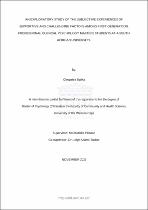An exploratory study of the subjective experiences of supportive and challenging factors among first-generation, professional clinical psychology masters students at a South African university
Abstract
Transformations in education policy following the establishment of a democratic South Africa have resulted in a marked increase in first-generation students in the country’s higher education institutions. While broadening access to higher education certainly represents a positive shift, student success rates at South African higher education institutions are of great concern. The literature globally points to a wide range of challenges experienced by first-generation students that place them at risk of not completing their education. These include financial stress, poor social support, isolation and marginalisation, cultural adaptation challenges, and greater family and work responsibilities. There is, however, a significant gap in the South African literature pertaining to the challenges experienced by first-generation students.

